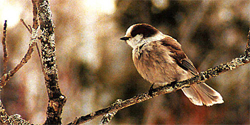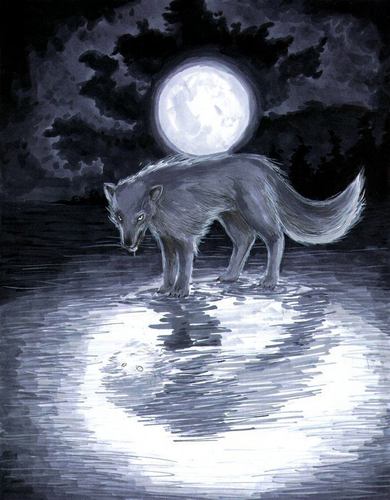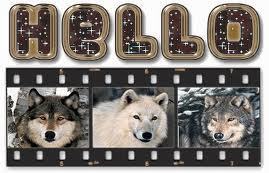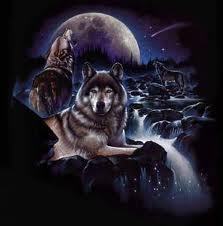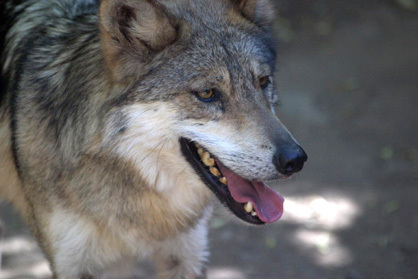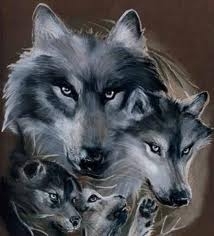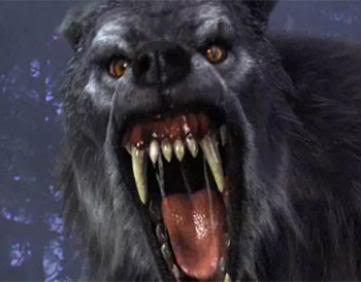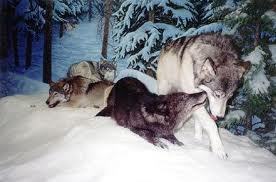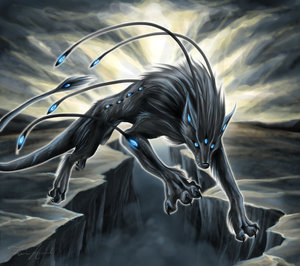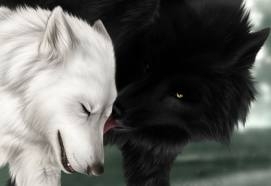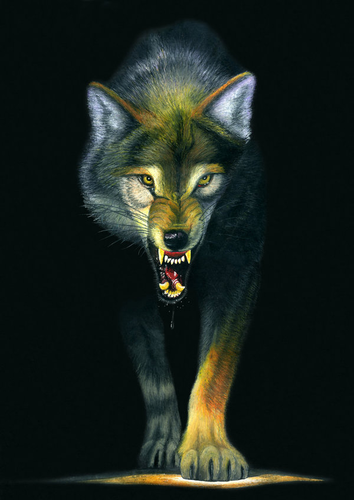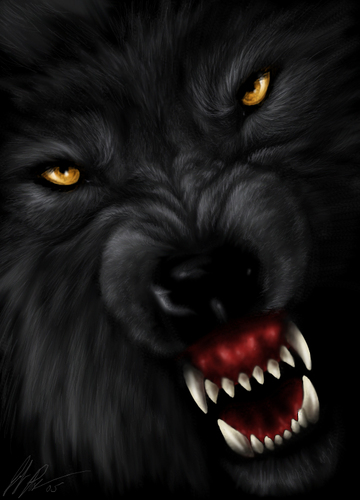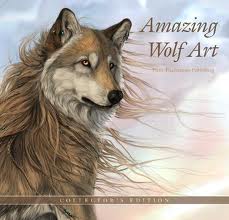Part III - Whispers
If only the wolves in these woods were as un-shy as this little chickadee.
My little campsite in the big woods of Northern Minnesota is a remote and peaceful place - just difficult enough to find to keep away the crowds, yet accessible enough to accommodate light camping of one or two nights. It is close to, but not inside the Boundary Waters Canoe Area (BWCAW) and no permit is needed for an over night stay allowing for the possibility of impromptu get-aways. But most importantly, it is deep within wolf country.
My solitary trips in these woods are a time of peace and tranquility. I come carrying only my camera and a small portion of food and water, and I leave feeling spiritually renewed and replenished. There is something both humbling and awe inspiring about being a guest in such a powerful environment. These woods, my woods, are a part of something larger and limitless, and when I am in them I become a part of that same vastness.
The BWCAW is almost one million acres of federally protected land that sits just below the United States and Canadian border. It consists of well over 1,000 lakes, rivers and streams and nearly 1,500 miles of canoe routes. Directly across the border into Canada is the Quetico Provincial Park, another 290 plus square miles of raw wilderness.
It is not possible to drive into the B.W.C.A.W or Quetico Park - only to their edge. The only way to experience them is by canoe. With the exception of a few large lakes that would otherwise be dangerous, motorized boats are not allowed.
The rugged Canadian country north of the Quetico is dotted with a few small towns and crossed only by one major highway, the only paved road between my campsite and the north pole. The vast majority of the land between the BWCAW and the uninhabited tundra of the far north looks much the same way it did when the glaciers receded twelve thousand years ago. In their wake they scraped bare the granite bedrock of the Canadian Shield and left behind bonny cliffs, deep pockets, and an almost endless expanse of remote lakes and rivers. In the centuries between then and now, boreal forests of black spruce, jack pine, trembling aspen and white birch have made it their home.
Leaving my campsite and heading southwest down the Fernburg Trail and past the out-post town of Ely, the vast tracks of lakes and timber eventually yield to gentle rolling hills dotted with lakes, farms, and countless comfortable communities filled with the charm of small town life. Continuing on most roads eventually dump into the expansive metropolitan sprawl of Minneapolis and St. Paul. This was my home as a child.
In contrast to this picturesque campsite my youthful territory could not have been more different, and I owe a debt of gratitude to my father for teaching me how to escape the bowls of the inner city long enough to have discovered such an enchanting corner of the forest. As neighborhoods go ours was nothing of which to brag or be ashamed, but it was most certainly urban. My summer days as a child were spent on the seat of my bicycle cruising the concrete sidewalks with the local boys club in search of innocent mischief. I swam at the municipal pool, had sleepovers , tested my skills at (and mostly failed) a variety of junior league sports, and traded baseball cards on the sly so mom wouldn't throw them away. Later, bikes became cars and sleepovers became all-nighters on the town. I am, by virtue of where I was raised, a city boy.
Yet despite our urban existence, the men in our family respected the annual tradition honored by so many city dwelling males. Each summer my father, little brother and I faithfully loaded the wagon with sleeping bags, firewood, tents, boots, and coolers and headed north. We traveled out of the city, past farm country, up the north shore of Lake Superior, and into the woods.
The woods!
How I loved the permanent smell of dampness and life. The smoke and crackle from our campfire inspired in me visions of another kind of existence. Licking the taste of fresh fried trout from my fingers, sleeping in a tent with only the sound of crickets, jumping from a canoe into water so cold it pierced my lungs, shafts of sun light dancing through smoke which curled and licked around tall pines These dark, lonely woods were filled with wonder and mystery and were certainly a welcome relief from the city-boy life I otherwise lived.
We had a favorite drive-up-and-park campsite on the southern shore of Gunflint Lake - a large, dark body of water that straddles the Minnesota, Canada border. While I was not overly bothered by our fellow campers only yards from where we pitched our tent, I nonetheless yearned for a true wilderness adventure on which no other human would be seen for days. I knew my father had done them as I remembered well the stories he told after returning home from such trips with youth groups from church. Alas, at the time I had been too young to tag along, and when I was older he was too tired.
Yet my father's unwillingness to guide us on such an adventure was only a minor inconvenience, as day-trips required only light paddling and portaging to slip into unknown wilderness worlds rich with wonder and dripping with adventure. I would often look around at the vast tracks of water and woods and wonder what scenes had played out here over the past hundred years. Had French fur traders used these same portages on their long voyages? How many Native Americans had paddled these same lakes? And even now, what wild animals were hiding in the woods, deep enough within the trees to see us but not be seen?
Frequently on these trips I would stand quietly for long periods on the American side of Gunflint Lake, staring across what seemed to be an ominous amount of dark water at the distant Canadian shore. As a young boy it always seemed to be a powerfully long ways off, as if it were not just another country but another word altogether. Although I often dared myself to do so it was not until the age of thirteen that I mustered the courage to climb solo into a canoe and make the journey.
Against the immense forest I felt insignificant and unworthy of the experience. The rented aluminum canoe glided a long, crooked path and eventually scraped onto the rocks of the opposite shore. I climbed from the canoe and wet my bare feet as I waded the few steps to dry ground, where I stopped with my back to the water and the forest before me. There were no camp sites, no campers, no crackling fires, and no people. The air was still and the woods before me were hauntingly silent. I felt naked and alone.
Minnesota is a land dotted with forest covered acres. From its midpoint starting just near my home in St. Cloud and continuing northward, its many lakes and rivers are often surrounded by vast tracks of wooded country side. While many of these woods can be home to deer, fox, coyote, bear, bobcat, and recently even cougar, there is nonetheless a domesticated hollowness about them which resonates, and I can never escape the awareness that traveling only a short distance in any direction would again bring an encounter with human creations.
But not now. Not here. I knew from studying maps back at home that, when in the Boundary Waters little more then shear wilderness existed between you and the North Pole. Here before me was ancient, mighty, and untamed wilds and I felt as though it was whispering to me not in a way that could be heard, but only felt in the deepest part of one's chest. It was if as if the woods were watching me and were aware, somehow, that I was trespassing on their territory, that if they could speak they would call me by name and ask what I wanted and why I was here. Had I walked forward I would have entered a world where man is not the dominant species, but a delicate and barely welcome guest.
It scared me. I scampered back to the canoe and paddled away, feeling all the while that something was watching me go.
If only the wolves in these woods were as un-shy as this little chickadee.
My little campsite in the big woods of Northern Minnesota is a remote and peaceful place - just difficult enough to find to keep away the crowds, yet accessible enough to accommodate light camping of one or two nights. It is close to, but not inside the Boundary Waters Canoe Area (BWCAW) and no permit is needed for an over night stay allowing for the possibility of impromptu get-aways. But most importantly, it is deep within wolf country.
My solitary trips in these woods are a time of peace and tranquility. I come carrying only my camera and a small portion of food and water, and I leave feeling spiritually renewed and replenished. There is something both humbling and awe inspiring about being a guest in such a powerful environment. These woods, my woods, are a part of something larger and limitless, and when I am in them I become a part of that same vastness.
The BWCAW is almost one million acres of federally protected land that sits just below the United States and Canadian border. It consists of well over 1,000 lakes, rivers and streams and nearly 1,500 miles of canoe routes. Directly across the border into Canada is the Quetico Provincial Park, another 290 plus square miles of raw wilderness.
It is not possible to drive into the B.W.C.A.W or Quetico Park - only to their edge. The only way to experience them is by canoe. With the exception of a few large lakes that would otherwise be dangerous, motorized boats are not allowed.
The rugged Canadian country north of the Quetico is dotted with a few small towns and crossed only by one major highway, the only paved road between my campsite and the north pole. The vast majority of the land between the BWCAW and the uninhabited tundra of the far north looks much the same way it did when the glaciers receded twelve thousand years ago. In their wake they scraped bare the granite bedrock of the Canadian Shield and left behind bonny cliffs, deep pockets, and an almost endless expanse of remote lakes and rivers. In the centuries between then and now, boreal forests of black spruce, jack pine, trembling aspen and white birch have made it their home.
Leaving my campsite and heading southwest down the Fernburg Trail and past the out-post town of Ely, the vast tracks of lakes and timber eventually yield to gentle rolling hills dotted with lakes, farms, and countless comfortable communities filled with the charm of small town life. Continuing on most roads eventually dump into the expansive metropolitan sprawl of Minneapolis and St. Paul. This was my home as a child.
In contrast to this picturesque campsite my youthful territory could not have been more different, and I owe a debt of gratitude to my father for teaching me how to escape the bowls of the inner city long enough to have discovered such an enchanting corner of the forest. As neighborhoods go ours was nothing of which to brag or be ashamed, but it was most certainly urban. My summer days as a child were spent on the seat of my bicycle cruising the concrete sidewalks with the local boys club in search of innocent mischief. I swam at the municipal pool, had sleepovers , tested my skills at (and mostly failed) a variety of junior league sports, and traded baseball cards on the sly so mom wouldn't throw them away. Later, bikes became cars and sleepovers became all-nighters on the town. I am, by virtue of where I was raised, a city boy.
Yet despite our urban existence, the men in our family respected the annual tradition honored by so many city dwelling males. Each summer my father, little brother and I faithfully loaded the wagon with sleeping bags, firewood, tents, boots, and coolers and headed north. We traveled out of the city, past farm country, up the north shore of Lake Superior, and into the woods.
The woods!
How I loved the permanent smell of dampness and life. The smoke and crackle from our campfire inspired in me visions of another kind of existence. Licking the taste of fresh fried trout from my fingers, sleeping in a tent with only the sound of crickets, jumping from a canoe into water so cold it pierced my lungs, shafts of sun light dancing through smoke which curled and licked around tall pines These dark, lonely woods were filled with wonder and mystery and were certainly a welcome relief from the city-boy life I otherwise lived.
We had a favorite drive-up-and-park campsite on the southern shore of Gunflint Lake - a large, dark body of water that straddles the Minnesota, Canada border. While I was not overly bothered by our fellow campers only yards from where we pitched our tent, I nonetheless yearned for a true wilderness adventure on which no other human would be seen for days. I knew my father had done them as I remembered well the stories he told after returning home from such trips with youth groups from church. Alas, at the time I had been too young to tag along, and when I was older he was too tired.
Yet my father's unwillingness to guide us on such an adventure was only a minor inconvenience, as day-trips required only light paddling and portaging to slip into unknown wilderness worlds rich with wonder and dripping with adventure. I would often look around at the vast tracks of water and woods and wonder what scenes had played out here over the past hundred years. Had French fur traders used these same portages on their long voyages? How many Native Americans had paddled these same lakes? And even now, what wild animals were hiding in the woods, deep enough within the trees to see us but not be seen?
Frequently on these trips I would stand quietly for long periods on the American side of Gunflint Lake, staring across what seemed to be an ominous amount of dark water at the distant Canadian shore. As a young boy it always seemed to be a powerfully long ways off, as if it were not just another country but another word altogether. Although I often dared myself to do so it was not until the age of thirteen that I mustered the courage to climb solo into a canoe and make the journey.
Against the immense forest I felt insignificant and unworthy of the experience. The rented aluminum canoe glided a long, crooked path and eventually scraped onto the rocks of the opposite shore. I climbed from the canoe and wet my bare feet as I waded the few steps to dry ground, where I stopped with my back to the water and the forest before me. There were no camp sites, no campers, no crackling fires, and no people. The air was still and the woods before me were hauntingly silent. I felt naked and alone.
Minnesota is a land dotted with forest covered acres. From its midpoint starting just near my home in St. Cloud and continuing northward, its many lakes and rivers are often surrounded by vast tracks of wooded country side. While many of these woods can be home to deer, fox, coyote, bear, bobcat, and recently even cougar, there is nonetheless a domesticated hollowness about them which resonates, and I can never escape the awareness that traveling only a short distance in any direction would again bring an encounter with human creations.
But not now. Not here. I knew from studying maps back at home that, when in the Boundary Waters little more then shear wilderness existed between you and the North Pole. Here before me was ancient, mighty, and untamed wilds and I felt as though it was whispering to me not in a way that could be heard, but only felt in the deepest part of one's chest. It was if as if the woods were watching me and were aware, somehow, that I was trespassing on their territory, that if they could speak they would call me by name and ask what I wanted and why I was here. Had I walked forward I would have entered a world where man is not the dominant species, but a delicate and barely welcome guest.
It scared me. I scampered back to the canoe and paddled away, feeling all the while that something was watching me go.

(matching description one)


